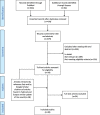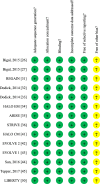European headache federation guideline on the use of monoclonal antibodies acting on the calcitonin gene related peptide or its receptor for migraine prevention
- PMID: 30651064
- PMCID: PMC6734227
- DOI: 10.1186/s10194-018-0955-y
European headache federation guideline on the use of monoclonal antibodies acting on the calcitonin gene related peptide or its receptor for migraine prevention
Erratum in
-
Correction to: European headache federation guideline on the use of monoclonal antibodies acting on the calcitonin gene related peptide or its receptor for migraine prevention.J Headache Pain. 2019 May 23;20(1):58. doi: 10.1186/s10194-019-0972-5. J Headache Pain. 2019. PMID: 31122188 Free PMC article.
Abstract
Background and aim: Monoclonal antibodies acting on the calcitonin gene-related peptide or on its receptor are new drugs to prevent migraine. Four monoclonal antibodies have been developed: one targeting the calcitonin gene-related peptide receptor (erenumab) and three targeting the calcitonin gene-related peptide (eptinezumab, fremanezumab, and galcanezumab). The aim of this document by the European Headache Federation (EHF) is to provide an evidence-based and expert-based guideline on the use of the monoclonal antibodies acting on the calcitonin gene-related peptide for migraine prevention.
Methods: The guideline was developed following the Grading of Recommendation, Assessment, Development, and Evaluation (GRADE) approach. The working group identified relevant questions, performed systematic review and analysis of the literature, assessed the quality of available evidence, and wrote recommendations. Where the GRADE approach was not applicable, expert opinion was provided.
Results: We found low to high quality of evidence to recommend eptinezumab, erenumab, fremanezumab, and galcanezumab in patients with episodic migraine and medium to high quality of evidence to recommend erenumab, fremanezumab, and galcanezumab in patients with chronic migraine. For several clinical questions, there was not enough evidence to provide recommendations using the GRADE approach and recommendations relied on experts' opinion.
Conclusion: Monoclonal antibodies acting on the calcitonin gene-related peptide are new drugs which can be recommended for migraine prevention. Real life data will be useful to improve the use of those drugs in clinical practice.
Keywords: Calcitonin gene-related peptide; Chronic migraine; Eptinezumab; Erenumab; Fremanezumab; Galcazenumab; Migraine; Prevention.
Conflict of interest statement
Authors, Financial disclosure (consulting, speaking fees, travel grants, research support). Simona Sacco Allergan, Bayer Healthcare, Eli Lilly, Medtronic, Novartis, TEVA. Lars Bendtsen Allergan, Biogen, Novartis, Teva. Messoud Ashina Allergan, Alder, Amgen, Eli Lilly, Novartis, Teva. Dimos-Dimitrios Mitsikostas Allergan, Amgen, Cefaly, ElectroCore, Genesis Pharma, Eli Lilly, Merck-Serono, Novartis, Roche, Sanofi-Genzyme, Speficar, Teva. Uwe Reuter Amgen, Autonomic Technologies Eli Lilly, Novartis, Teva. Gisela Terwindt Eli Lilly, Novartis, Teva. Paolo Martelletti Allergan, Amgen, Electrocore, Eli Lilly, Novartis, Springer HealthCare, Teva.
Figures
Comment in
-
Letter to the editor: European headache federation guidelines on the use of monoclonal antibodies acting on the calcitonin gene-related peptide or its receptor for migraine prevention.J Headache Pain. 2019 Jun 4;20(1):67. doi: 10.1186/s10194-019-0994-z. J Headache Pain. 2019. PMID: 31164079 Free PMC article. No abstract available.
References
-
- GBD 2015 Disease and injury incidence and prevalence collaborators Global, regional, and national incidence, prevalence, and years lived with disability for 310 diseases and injuries, 1990–2015: a systematic analysis for the Global Burden of Disease Study 2015. Lancet. 2016;388:1545–1602. doi: 10.1016/S0140-6736(16)31678-6. - DOI - PMC - PubMed
Publication types
MeSH terms
Substances
LinkOut - more resources
Full Text Sources
Medical



